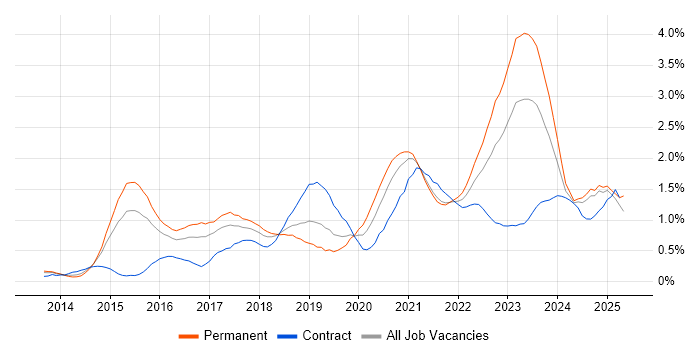Platform as a Service (PaaS)
South West > Bristol
The table below provides summary statistics for permanent job vacancies advertised in Bristol requiring PaaS skills. It includes a benchmarking guide to the annual salaries offered in vacancies that cited PaaS over the 6 months leading up to 18 May 2025, comparing them to the same period in the previous two years.
| 6 months to 18 May 2025 |
Same period 2024 | Same period 2023 | |
|---|---|---|---|
| Rank | 81 | 118 | 86 |
| Rank change year-on-year | +37 | -32 | +56 |
| Permanent jobs citing PaaS | 22 | 45 | 91 |
| As % of all permanent jobs advertised in Bristol | 1.77% | 1.44% | 3.53% |
| As % of the Cloud Services category | 5.99% | 4.24% | 8.43% |
| Number of salaries quoted | 21 | 43 | 26 |
| 10th Percentile | £49,500 | £52,750 | £35,483 |
| 25th Percentile | £51,250 | £57,500 | £39,304 |
| Median annual salary (50th Percentile) | £71,991 | £75,000 | £55,000 |
| Median % change year-on-year | -4.01% | +36.36% | -23.23% |
| 75th Percentile | £73,886 | £87,500 | £63,521 |
| 90th Percentile | £93,778 | - | £86,875 |
| South West median annual salary | £71,991 | £66,250 | £55,000 |
| % change year-on-year | +8.67% | +20.45% | -4.35% |
All Cloud Skills
Bristol
PaaS falls under the Cloud Services category. For comparison with the information above, the following table provides summary statistics for all permanent job vacancies requiring cloud computing skills in Bristol.
| Permanent vacancies with a requirement for cloud computing skills | 367 | 1,061 | 1,079 |
| As % of all permanent jobs advertised in Bristol | 29.45% | 33.84% | 41.89% |
| Number of salaries quoted | 300 | 834 | 685 |
| 10th Percentile | £41,218 | £32,500 | £35,483 |
| 25th Percentile | £51,188 | £42,656 | £46,250 |
| Median annual salary (50th Percentile) | £62,500 | £60,000 | £59,526 |
| Median % change year-on-year | +4.17% | +0.80% | +8.23% |
| 75th Percentile | £81,250 | £75,000 | £77,500 |
| 90th Percentile | £95,000 | £87,500 | £94,000 |
| South West median annual salary | £55,000 | £52,500 | £54,590 |
| % change year-on-year | +4.76% | -3.83% | +3.98% |
PaaS
Job Vacancy Trend in Bristol
Job postings citing PaaS as a proportion of all IT jobs advertised in Bristol.

PaaS
Salary Trend in Bristol
3-month moving average salary quoted in jobs citing PaaS in Bristol.
PaaS
Salary Histogram in Bristol
Salary distribution for jobs citing PaaS in Bristol over the 6 months to 18 May 2025.
PaaS
Co-occurring Skills and Capabilities in Bristol by Category
The follow tables expand on the table above by listing co-occurrences grouped by category. The same employment type, locality and period is covered with up to 20 co-occurrences shown in each of the following categories:
